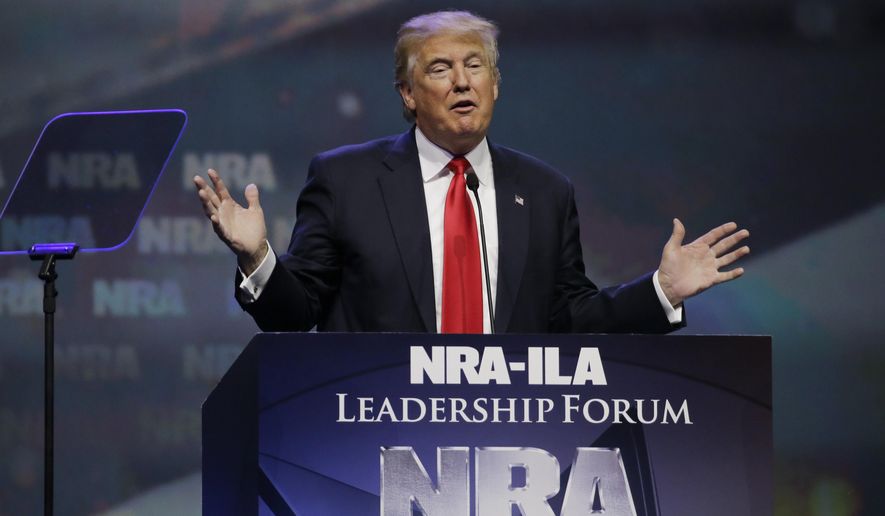Emboldened by the Republican Party’s grip on the levers of power in Washington, Second Amendment advocates plan to pressure the White House and Congress to enact long-desired legislation to expand concealed carry rights and roll back gun-free zones.
Top priorities for the gun rights lobby include federal concealed carry reciprocity, which would recognize out-of-state permits anywhere in the country, and repealing gun-free zones around military bases and schools.
President-elect Donald Trump has called for concealed carry reciprocity and lamented gun-free zones on military bases, and advocates now want him and other Republicans to follow through on their campaign promises.
“I call on Congress and the president-elect to pass national right-to-carry reciprocity as quickly as it can be written and signed,” Wayne LaPierre, executive vice president of the National Rifle Association, said in a postelection video message to supporters.
“And it is time, once and for all, to end the absolute fallacy of gun-free zones,” Mr. LaPierre said.
Erich Pratt, executive director of Gun Owners of America, said he thinks his group’s legislative priorities have a “better than average chance” of being enacted.
In addition to concealed carry reciprocity and eliminating gun-free zones around military bases and schools, Gun Owners of America wants Mr. Trump to repeal President Obama’s gun-related executive actions and prevent veterans or seniors from losing their gun rights without due process.
Mr. Pratt said his group is mobilizing a “grass-roots army” that has vociferously opposed former CIA Director David H. Petraeus as secretary of state.
Mr. Trump ultimately announced Exxon Mobil CEO Rex Tillerson as his choice for secretary of state, but his transition team also had mentioned Mr. Petraeus along with former Massachusetts Gov. Mitt Romney, former New York City Mayor Rudolph W. Giuliani and others.
Mr. Petraeus and retired astronaut Mark Kelly teamed up this year to launch the gun control advocacy group Veterans Coalition for Common Sense. Mr. Kelly is the husband of former Rep. Gabrielle Giffords, who was seriously wounded by a deranged gunman at a constituent event in Arizona in January 2011 and is now a prominent advocate for stricter controls.
Mr. Pratt also vouched for the concealed carry legislation from Rep. Richard Hudson, the North Carolina Republican who introduced the bill in the House.
“GOA has seen his language, and we can vouch that it will be the best reciprocity bill that has ever been introduced in Congress,” Mr. Pratt said. “And we are encouraged by the fact that Trump has said he wants to sign a reciprocity bill.”
Alan Gottlieb, chairman of the Citizens Committee for the Right to Keep and Bear Arms, has listed 11 items he would like Mr. Trump and congressional Republicans to address.
The list includes concealed carry initiatives, as well as legalizing short-barreled rifles and assigning an assistant attorney general “whose only job will be to investigate and prosecute Second Amendment violations by state and local governments.”
“I’d say we’d be disappointed if a majority didn’t happen,” Mr. Gottlieb said.
“The Citizens Committee for the Right to Keep and Bear Arms is planning on using public pressure,” he said. “We’re planning to make this people-oriented and make it people power, and that’s something that Donald Trump listens to.”
Gun control advocates, meanwhile, are steeling for a more defensive posture after many thought the Sandy Hook Elementary School shooting in Newtown, Connecticut, in 2012 would fundamentally change the political calculus, only to have their legislative hopes dashed at the federal level.
The gun lobby has been campaigning for concealed carry reciprocity for years but have been blocked by activists on the other side, said Stacey Radnor, a spokeswoman for the gun control group Everytown for Gun Safety.
“At the end of the day, legislators on both sides of the aisle recognize that concealed carry reciprocity and repealing gun-free zones conflicts with states’ rights to govern themselves,” Ms. Radnor said.
Arguably more important than the legislative agenda for gun rights groups is Mr. Trump’s choice to fill the U.S. Supreme Court vacancy left by the death of Justice Antonin Scalia.
Mr. LaPierre said Mr. Trump’s nominee will be “a generational victory for Second Amendment freedom.”
Justice Scalia wrote the majority 5-4 opinion in the 2008 District of Columbia v. Heller case upholding the constitutional right to bear arms.
Mr. Trump frequently criticized Hillary Clinton during the election campaign for questioning the landmark decision and said the Democratic presidential nominee wanted to abolish the Second Amendment.
• David Sherfinski can be reached at dsherfinski@washingtontimes.com.




Please read our comment policy before commenting.